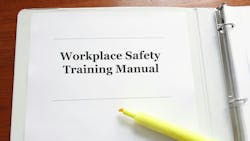The hazard communication system (HCS) regulations are covered in 29CFR1910.1200. Subsection (h) provides requirements for employee information and training. Right off the bat, OSHA makes it clear that a dog and pony show in lieu of actual training is not acceptable. They do this by using the word “effective” [1910.1200(h)(1)]. This training must cover the hazardous chemicals in the employees’ work area at the time of their initial assignment and whenever a new hazardous chemical (one they have not been previously trained about) is “about to be introduced.” Notice those last four words — the training must precede the introduction of the chemical. That is, people must be trained before the chemical is in their work environment.
One mistake some employers make is scheduling HCS training (for example, quarterly) and catching up on whatever training is missing due to changes from the previous training session. OSHA will cite you for this. Even worse, an untrained employee may be badly injured to due lack of timely training. So, make sure to get the timing right.
What information must you provide employees? This is laid out in 1910.1200(h)(2)(i) through (iii):
- The requirements of 1910.1200.
- Any operations in their work area where hazardous chemicals are present.
- The location and availability of the written HCS. This includes the lists of hazardous chemicals and the safety data sheets.
What training must you provide employees? This is laid out in 1910.1200(h)(3)(i) through (iv):
- Methods and observations that may be used to detect the presence or release of a hazardous chemical.
- The physical health, simple asphyxiation, combustible dust, and pyrophoric gas hazards along with other hazards not otherwise classified. This requirement applies to all of the chemicals in the work area.
- How employees can protect themselves.
- The details of the HCS.
As you can see, that training covers a lot of ground. Be sure to allow for sufficient time to cover it, noting that training counts only if it is effective.
In many cases, it is cost effective to hire a training consultant to review your HCS and conduct the appropriate training. The reason that can be cost-effective is a qualified consultant will tend to make the training process very efficient and thus you pay out far less in labor hours to complete the training. If the consultant specializes in HCS training, she or he most likely already has a proven system and merely needs to incorporate your particulars. If you go this route, be sure the consultant can also train two or three people who can conduct the advance training needed when a new chemical is about to be introduced.
About the Author

Mark Lamendola
Mark is an expert in maintenance management, having racked up an impressive track record during his time working in the field. He also has extensive knowledge of, and practical expertise with, the National Electrical Code (NEC). Through his consulting business, he provides articles and training materials on electrical topics, specializing in making difficult subjects easy to understand and focusing on the practical aspects of electrical work.
Prior to starting his own business, Mark served as the Technical Editor on EC&M for six years, worked three years in nuclear maintenance, six years as a contract project engineer/project manager, three years as a systems engineer, and three years in plant maintenance management.
Mark earned an AAS degree from Rock Valley College, a BSEET from Columbia Pacific University, and an MBA from Lake Erie College. He’s also completed several related certifications over the years and even was formerly licensed as a Master Electrician. He is a Senior Member of the IEEE and past Chairman of the Kansas City Chapters of both the IEEE and the IEEE Computer Society. Mark also served as the program director for, a board member of, and webmaster of, the Midwest Chapter of the 7x24 Exchange. He has also held memberships with the following organizations: NETA, NFPA, International Association of Webmasters, and Institute of Certified Professional Managers.
